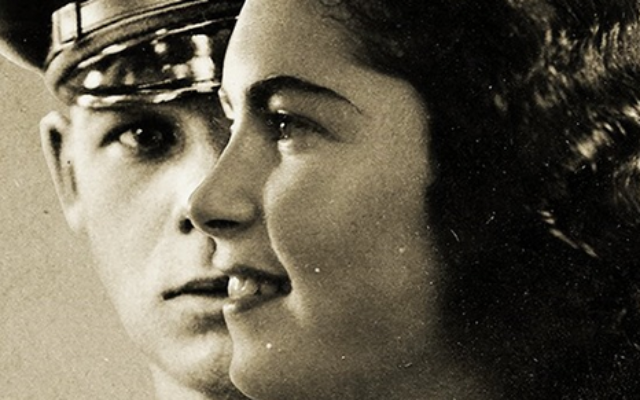Atlanta Jewish Film Festival Names Winners
Israeli and Palestinian films take top prizes at this year’s festival.
“Here We Are,” a sensitive film about the relationship between a father and his autistic son was the big award winner at this year’s Atlanta Jewish Film Festival.
At awards ceremonies Wednesday, the film was named best narrative film by a three- judge panel and also won top honors in the same category as the Audience Award film, which is based on the votes of festival ticket holders.
The jury award was presented by Diane Baker, the distinguished Hollywood actress whose long career in films and on television began with the 1959 film, “The Diary of Anne Frank,” where she played Frank’s sister Margot.

She described “Here We Are” as a film that “shows how a universe of meaning can be packed into a single relationship.”
The film last year was nominated for Best Feature Film at the Israeli Ophir Awards, the country’s top film prize, as well as nominations in eight other categories. It was also among Israel’s official entries in the Cannes Film Festival.
Director Nir Bergman, in brief remarks from Israel, thanked the festival for the recognition and said he hoped “it will help other people to hear about the film. And we wish that as many as possible people in America will see the film.”
Bergman is perhaps best known to American audiences as one of the creators of what became the HBO hit series “In Treatment.”
Taking home the award for best documentary was another film by an Israeli, “Love It Was Not.”

The film’s director Maya Sarfaty scoured film archives to piece together the astonishing story of a romance between a Nazi SS officer and a young Jewish woman that takes place literally within the shadows of the crematoria in Auschwitz, the German concentration camp.
The award was presented by Nancy Spielberg, sister of Steven Spielberg, the famed Hollywood director. Her film “Picture of His Life” was nominated for Best Documentary at last year’s AJFF.
She described “Love It Was Not” as “a universal story that echoes some of the deepest ethical complexities of the Torah: Who should live and who should die. This is not the kind of Holocaust story that we even imagined could exist.”
In a rare win for a Palestinian film, the Human Rights Jury Prize went to “200 Meters.” It tells the dramatic story of the difficulties an Arab construction worker and father faces as he attempts to maintain a relationship with his mother.
They live only 200 meters (219 yards) from each other, but are separated by the wall that Israel has built along its border and the territories on the West Bank.
In his brief comments accepting the award, director Ameen Nayfeh, from his home in the Palestinian territories, said that “it meant a lot to me to participate in this festival” and he went on to say that “this will also help the film to be seen by more people in the United States and everywhere around the world.”
The film is Jordan’s official entry in this year’s Academy Award for best foreign film. It has previously won the People’s Choice Award at the prestigious Venice Film Festival.
Other jury prize winners at the AJFF this year were Johanne Helgeland for “The Crossing,” which won the Emerging Filmmaker prize; “Sublet,” which was named as the Building Bridges winner and “I Am Here” for Audience Award documentary.

Honorees in the short film category were “Masel Tov Cocktail” for fictional short and “Space Torah” for Audience Award short.
This year’s festival, in which 38 films and 12 shorts were screened, was considerably shorter than in recent years, although film quality was generally considered to have remained high.
Kenny Blank, executive director of the AJFF during practically all of its 21-year history, praised the “caliber of these jury and audience award winners. It really demonstrates that the cinematic tradition remains very much alive, as vital and robust as ever. And that’s despite the challenges brought on by this pandemic.”
For more information about the awards, visit https://www.ajff.org/festival.




comments